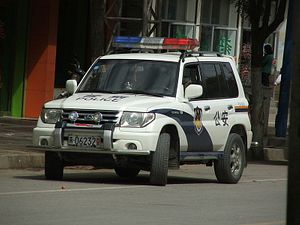The New York Times’ Sinosphere blog reports on the detention of Ilham Tohti, a Uyghur professor who has a history of speaking out about anti-Uyghur discrimination in Xinjiang. Tohti, who lives and works in Beijing, had experienced increased pressure since the October 2013 attack in Tiananmen Square, where a purposeful car crash killed five. The attack was blamed on a Uyghur terrorist group. The Chinese government has said Tohti is “suspected of breaking the law,” but so far there has been no information on what charges he faces. In response, Tohti’s wife, Guzailai Nu’er told Reuters that her husband “didn’t do anything unlawful … All he has done is write detailed articles researching the population in Xinjiang. There’s nothing else to it.”
Since the Tiananmen attack, there has been increasing violence in Xinjiang, especially near the city of Kashgar. The Chinese government typically attributes deaths in Xinjiang to terrorist attacks or police counterterrorism efforts. Uyghur activists, however, have said that several of the incidents involved Chinese police firing on peaceful protestors. With the rise in violence in Xinjiang, the Chinese government has grown increasingly sensitive about the topic of Uyghur repression, which may have been the driving factor behind Tohti’s arrest.
In other news, the Japanese newspaper Asahi Shimbun reported that China’s original draft air defense identification zone (ADIZ) was smaller than the final version. The original proposal had China’s ADIZ more or less matching China’s Exclusive Economic Zone. The ADIZ was later revised to extend eastward towards Japan. Apparently, the Chinese government wanted to make sure that, at its closest point, the ADIZ was 130 kilometers away from a Japanese island, because Japan’s own ADIZ ends only 130 km away from China. The Asahi Shimbun account is another example of China’s strategy — Beijing is so far being careful to provide cover for itself by matching Japan’s moves tit-for-tat.
Meanwhile, China continues its global media battle against Japan, as Jin Kai noted in an article for The Diplomat. The Chinese government is stepping up its efforts to remind Western countries that they too were victimized by Japanese aggression during World War II. Reuters reports that journalists were taken to visit a camp in Shenyang where Japan kept prisoners-of-war from the United States, Australia, Canada, New Zealand, and the Netherlands. At the camp, reporters “were shown graphic images of the terrible conditions endured by some 2,000 prisoners,” wrote Megha Rajagopalan for Reuters.
During Thursday’s press conference, a reporter specifically asked Foreign Ministry Spokesperson Hong Lei if China was “trying to remind the U.S., Australia and other western countries that Japan also committed war crimes against them during WWII and that they should side with China?” Hong replied, “The Chinese Foreign Ministry and embassies have called on all countries to … be vigilant against [Shinzo] Abe’s actions, [and] jointly uphold the victory of WWII won at the cost of tens of millions of lives.”
In a follow-up to news of a deadly explosion in Guizhou province, the BBC (citing Chinese state media) reported that eight people have been arrested in connection with the blast. The death toll was increased to 15. Little more news is available on the explosion, but the Wall Street Journal’s China Real Time Report explored the site’s alleged connection to gambling. According to the article, police estimate that in Qiandongnan prefecture, where Laoshan village is located, illegal gambling dens are worth more than 100 million RMB ($16.5 million).

































